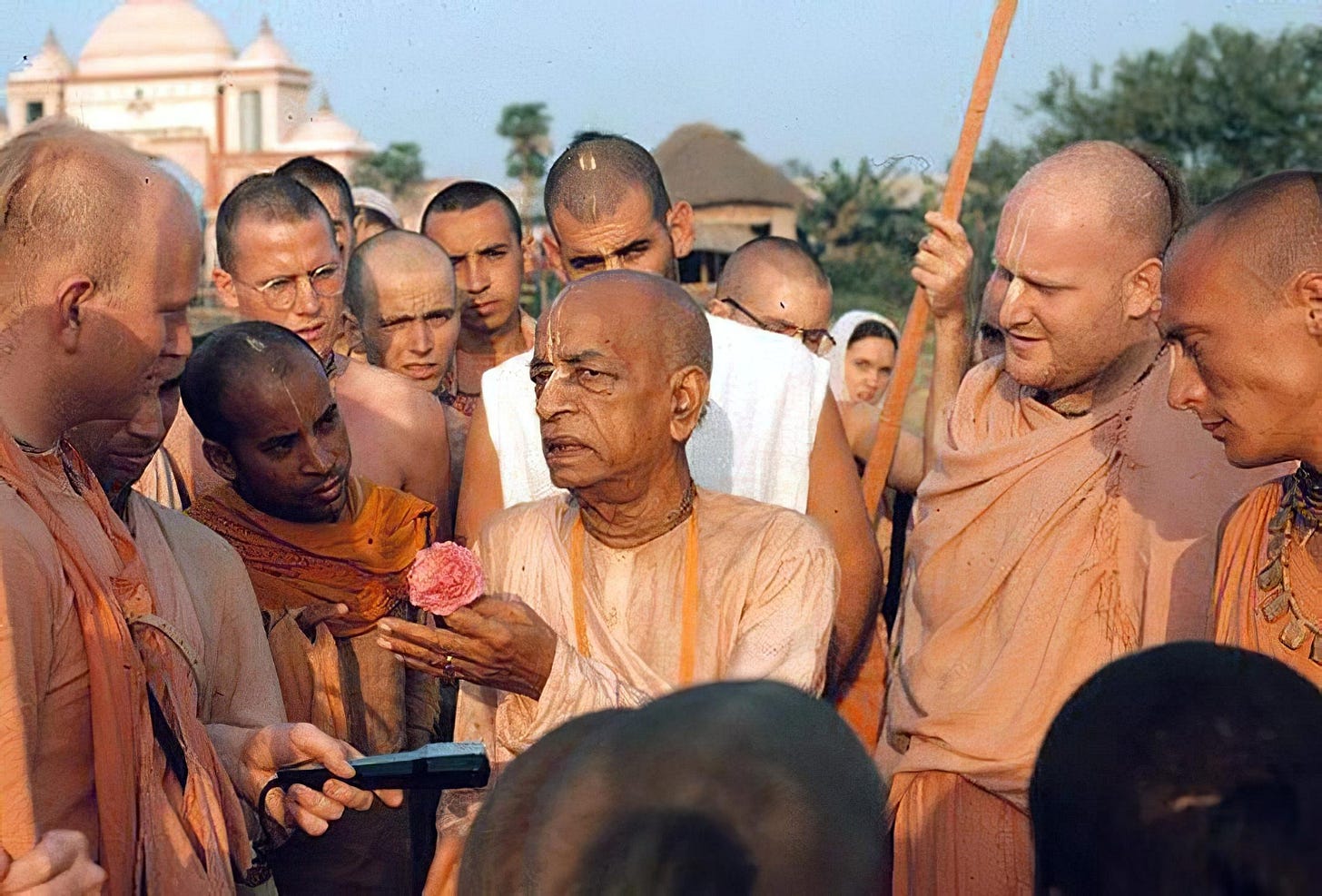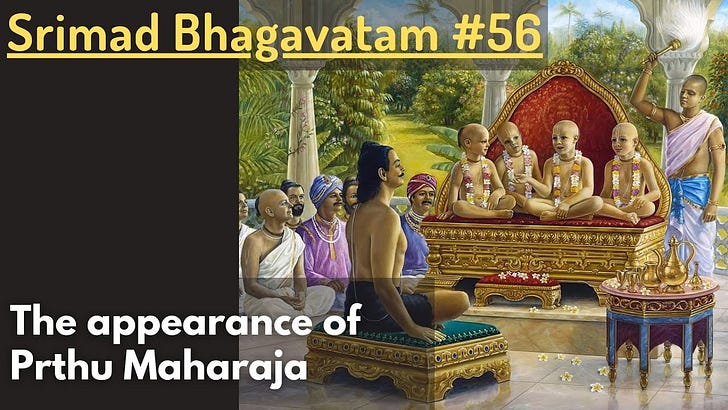Challenges we face in our generation
Just as devotees in the 1970s had to navigate through all the drugs, craziness, and impersonalism of the counterculture to keep practicing spiritual life, our generation faces its own challenges.
Srila Prabhupada explained many topics in his books. Some topics are explained in detail, while other topics are explained in a subtle or embryonic way, giving the conclusions we need to reach a certain level of knowledge to understand. As a result, his books can be understood at different levels as our qualification grows. Some points can be immediately understood, and when we later read the same text again, this understanding unlocks the next level of understanding of the text, and so on.
As long as we accept Prabhupada as a guide and continue to study his books under the right guidance, he keeps evolving in our spiritual understanding and accumulates the right realizations. This is not necessarily a quick process, since there is so much information and realizations to be absorbed, but that’s a process we can follow through life. As long as we keep studying, our understanding and realization will keep increasing. There is not really a limit, since Prabhupada describes all topics in his books, all the way to pure love of Godhead in the highest level. As our realization deepens, we gain access to new levels of understanding of his teachings, which are hidden in plain sight for students still locked in the lower tiers of realization.
If later we decide to also study books from our previous ācāryas, the conclusions given by Srila Prabhupada will help us to also understand them. That’s the meaning of paramparā: our diksa or siksa guru helps us to understand Srila Prabhupada’s teachings, and once he understands what Prabhupada explained, we can use this knowledge to go up in the paramparā and understand also the teachings of the previous ācāryas.
For spiritual knowledge to be understood, the paramparā has to be an unbroken line. The guru needs to bring us to Srila Prabhupada, so he can bring us to Krsna, with the help of all predecessor ācāryas. If one does not accept the help of a spiritual teacher (or accept one in just a formal way, without really accepting his teachings), or if the guru is not a faithful follower of Srila Prabhupada, one can’t expect to reach the right philosophical conclusions.
Not all Vaiṣnavas are the same. There are different Vaiṣnava lines with different degrees of authenticity. The Gauranga Nagaris in Navadvīpa, for example, look perfectly fine Vaishnavas, with tilaka and reasonably good habits, but they try to impose the mood of an enjoyer on Mahāprabhu. They have their own literature, which contains many fabricated stories of supposed pastimes of Mahāprabhu with the girls of Navadvīpa, as well as other philosophical misconceptions. One may come to them and think one has found a new set of pastimes of the Lord that were previously hidden, while in reality, he is just reading offensive spiritual fan-fiction. Similarly, many babaji lines in Vṛndāvana have many philosophical misconceptions that infiltrate our movement as devotees associate with them and bring their ideas. Srila Prabhupada warned against the dangers of such association, but of course, many think they know better.
As long as one does not have a solid philosophical understanding and the proper attitude of surrender to the spiritual process, he or she can be very easily confused by different opinions and fail to reach the right conclusions. When the sambandha is incorrect, the abhidheya (practice) will also be compromised, and the prayojana (final goal) may not be reached.
The general instruction is that we should study a small number of books and be sure to understand them properly before starting to study other books. The problem is that nowadays many don’t care to study even basic books, like the Bhagavad-Gita, Teachings of Lord Caitanya, Nectar of Devotion, etc. (what to say about the Srimad Bhagavatam or Sri Caitanya Caritāmṛta, which are much larger works), and want to immediately venture into supposed advanced books from the previous ācāryas, translated and commented by questionable sources.
Translations of Sanskrit works are always a problem, because the text has always to be interpreted. Each author will thus impose his own conclusions on the text. This is not a problem when the author is a self-realized soul who can reveal the deep conclusions of the text, or at least a bona fide, well-intentioned follower of his own spiritual master, but it becomes a serious problem when the interpreter is a conditioned soul and perpetuates his philosophical misconceptions in his writings. By studying such books, we absorb such mistaken conclusions, often on a subconscious level. Reading translations from questionable sources is thus not only useless but damaging. One does better just looking at the ceiling than studying such books.
It becomes even worse when a person, armed with one’s newly-found erudition, researches a little bit on this or that subject and comes to the conclusion that Srila Prabhupada was teaching differently than previous ācāryas, or that he was deliberately telling white lies with the goal of making his preaching sweeter for the western audience. This is precisely the wrong conclusion one must avoid. This means to basically break his connection with the paramparā, and practically guarantees that one will reach the wrong conclusions and will not be able to reach the ultimate goal.
Srila Prabhupada studied the writings of previous ācāryas much more deeply than we (and, apart from being a self-realized soul, he had the advantage of understanding both Bengali and Sanskrit, instead of depending on imperfect translations, as we do). He wrote his books after all this study, at the peak of his realization. Even if we have trouble understanding or reconciling Prabhupada’s words with the previous ācāryas or other sources, we must understand that the problem is with our imperfect understanding, and not with Prabhupada’s writings.
Just as devotees in the 1970s had to navigate through all the drugs, craziness, and impersonalism of the counterculture to keep practicing spiritual life, our generation has the challenge of navigating through the seas of philosophical speculation, sahajiyā influence, false erudition, individualism, and pride to be able to go somewhere.
Read also:
The appearance of Pṛthu Maharaja (Srimad Bhagavatam #56)
By killing Vena, the Brāhmaṇas stopped his policy of suppressing sacrifices and the worship of the Supreme Lord. However, this led to another problem, which was the rise of thieves and criminals who started plundering the citizens unopposed. It is described that the running of all these thieves formed dust storms around the kingdom, suggesting they had organized themselves in large hordes and were systematically plundering and killing. The save the citizens, the Lord appeared as Pṛthu Maharaja.




Hare Krsna Prabhuji.
This is a wonderful article. Thank you for bringing this subject matter to light.
Unfortunately, nowadays people don't value SP books, and don't realize that this is the essence of Krsna consciousness. Thank you for writing this, every devotee should read this article. Jay Srila Prabhupada.
Hare Krishna Prabhu ji 🙏 very much needed article . These things are so prominent everywhere. I have heard from so many bogus devotees they said by become devotees of Radha rani Krishna become their servant and they try to prove that with wrong interpretation of scriptures . In today's era , we must stick or catch lotus feet of Prabhupada and Parampara and thoroughly study Prabhupada books for bonafide understanding.